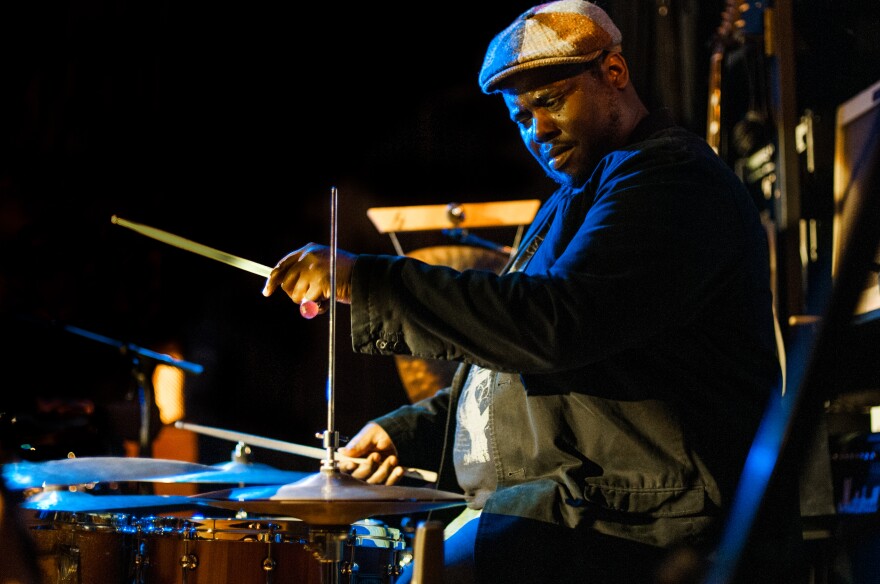Organizers of the Jazz Coalition had a lot of phone calls to make this week.
The industry collective, which formed in response to the hardships of the coronavirus pandemic, spent the last month mobilizing behind its signature initiative: a Commission Fund designed to award $1,000 grants to an array of artists, in support of the creation of new work.
Now — after a whirlwind fundraising campaign, a public nomination process, and the consideration of jury results — the Jazz Coalition has finalized its first wave of awardees. “We wanted to make a personal call to each of the winners,” says Brice Rosenbloom, who conceived of the Commission Fund. “So over the last couple of days, we’ve been having conversations with the artists, and hearing the inspiration that they got.”
There are 51 grantees in total, and each has their own story to tell. The point of the commissions is to encourage the artists to draw on this experience, however they can. “It definitely puts some wind in my sails,” drummer Johnathan Blake tells WBGO, speaking from his home in Paterson, N.J. “I’ve taken full advantage of being home, practicing and writing and composing. Something like this gives me more of a push and incentive to write, and to continue to be creative.”
Blake, who is featured on the recent Kenny Barron-Dave Holland Trio album Without Deception, belongs to a busy peer group in New York. Some of his close associates are also Commission Fund recipients, including bassist Linda May Han Oh, vibraphonist Joel Ross and saxophonist Melissa Aldana. Also among the awardees is Rio Sakairi, artistic director at The Jazz Gallery, where these and other musicians could often be heard before the city’s nightlife went dark.
The Jazz Coalition did make an effort to diversify beyond the New York scene, awarding grants to artists in other American cities, as well as Cuban singer Daymé Arocena, South African pianist Nduduzo Makhathini and British saxophonist Shabaka Hutchings. What the recipients all share, at the risk of stating the obvious, is a massive disruption to their livelihood. As Hutchings told me in mid-March, for an NPR news story about the coronavirus’s impact on jazz: “This is really the time to become creative about survival.”
Like so many musicians, trumpeter Jaimie Branch was confronted with that reality in the most immediate terms. In the second week of March, she embarked on what was supposed to be a three-week tour, starting with shows at the Kennedy Center in Washington, D.C., and Roulette in New York. “By the time we were done with soundcheck at Roulette, I knew that the tour was done,” Branch says. “That was March 12, and we got six cancelations in one hour.”

This scenario, extrapolated outward, is what the Jazz Coalition was created to address. Rosenbloom, best known as founder and producer of the Winter Jazzfest, first shared the idea with an assortment of colleagues. Two of them, artist manager Gail Boyd and promoter Danny Melnick, signed on as cofounders.
Support for the Jazz Coalition has been robust, with members signing on from across the musical landscape, and endorsements coming from prominent artists.
The first round of recipients was selected by an anonymous jury of 17 coalition members: musicians, presenters, journalists, agents. Rosenbloom says there will almost certainly be a second round, contingent on continuing financial support.
The awardees will surely create a diverse range of music, to be presented at participating Jazz Coalition venues once social distancing orders have relaxed. “The music we make is often a reflection of where we are, and the world we live in,” says Branch. “So the music will be affected by this moment.”
For Blake, the commission provides a chance to acknowledge losses sustained by the jazz community in recent weeks. “I want it to be a tribute to some of our fallen heroes,” he says. “Especially because a lot of the people we’ve lost are from my hometown of Philly, and they were, in one way or another, mentors to me.”
Of course, there are substantial challenges ahead for the jazz ecology, even as some states begin reopening their business. “It’s very daunting right now, because of all the unknowns,” Rosenbloom says. The Winter Jazzfest, as a case in point, typically involves a constellation of crowded clubs in Lower Manhattan, at a time that overlaps with flu season. “I’m not expecting us to be able to have the real capacities we’ve had in the past,” Rosenbloom says. “At best we’ll have limited capacities in the venues we have — and that’s the venues that are still open.”
For the moment, he adds, such considerations are secondary to the Jazz Coalition effort: “It’s really about that morale boost, the bright spot that we feel.”
To learn how to support the Jazz Coalition, visit its website.



